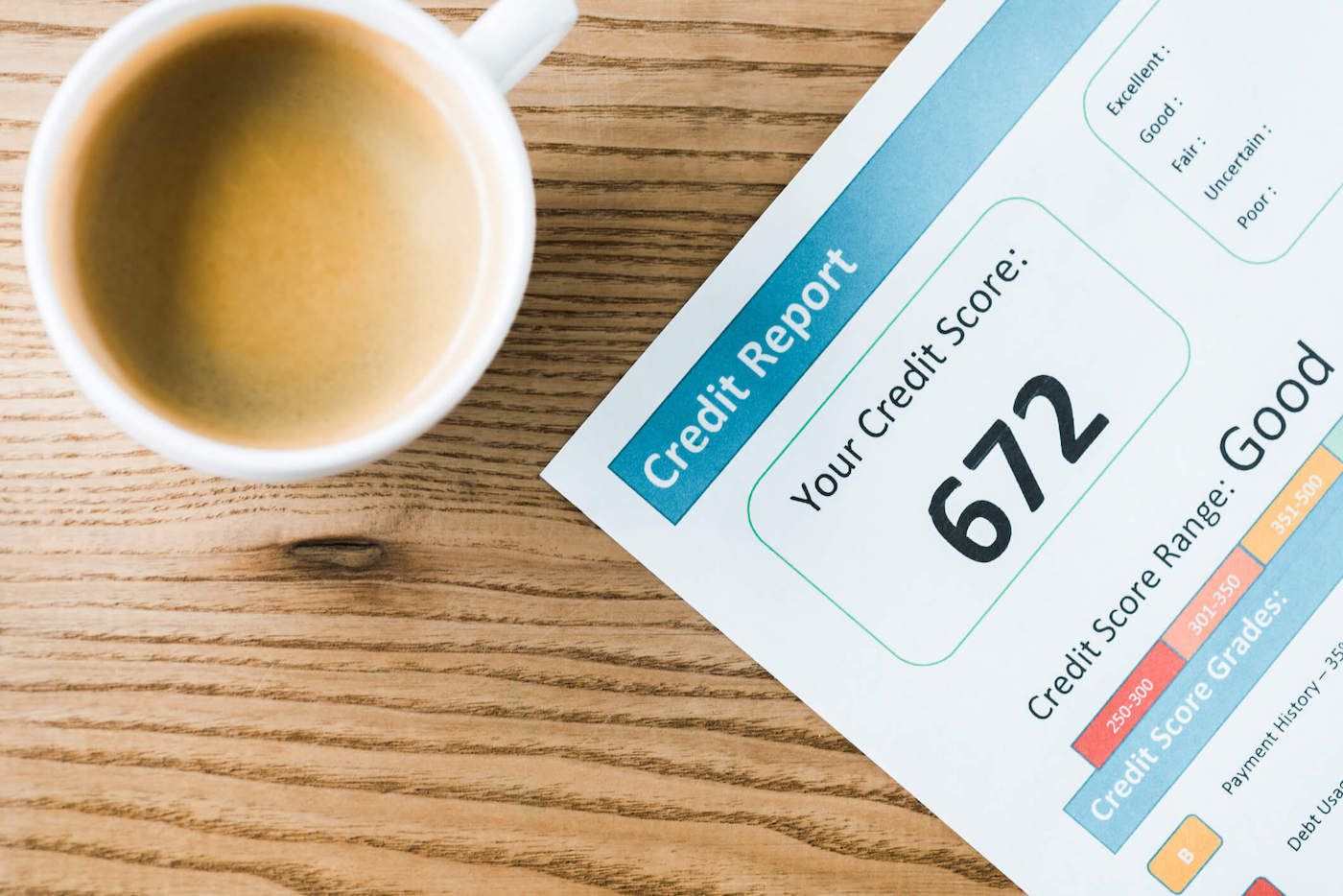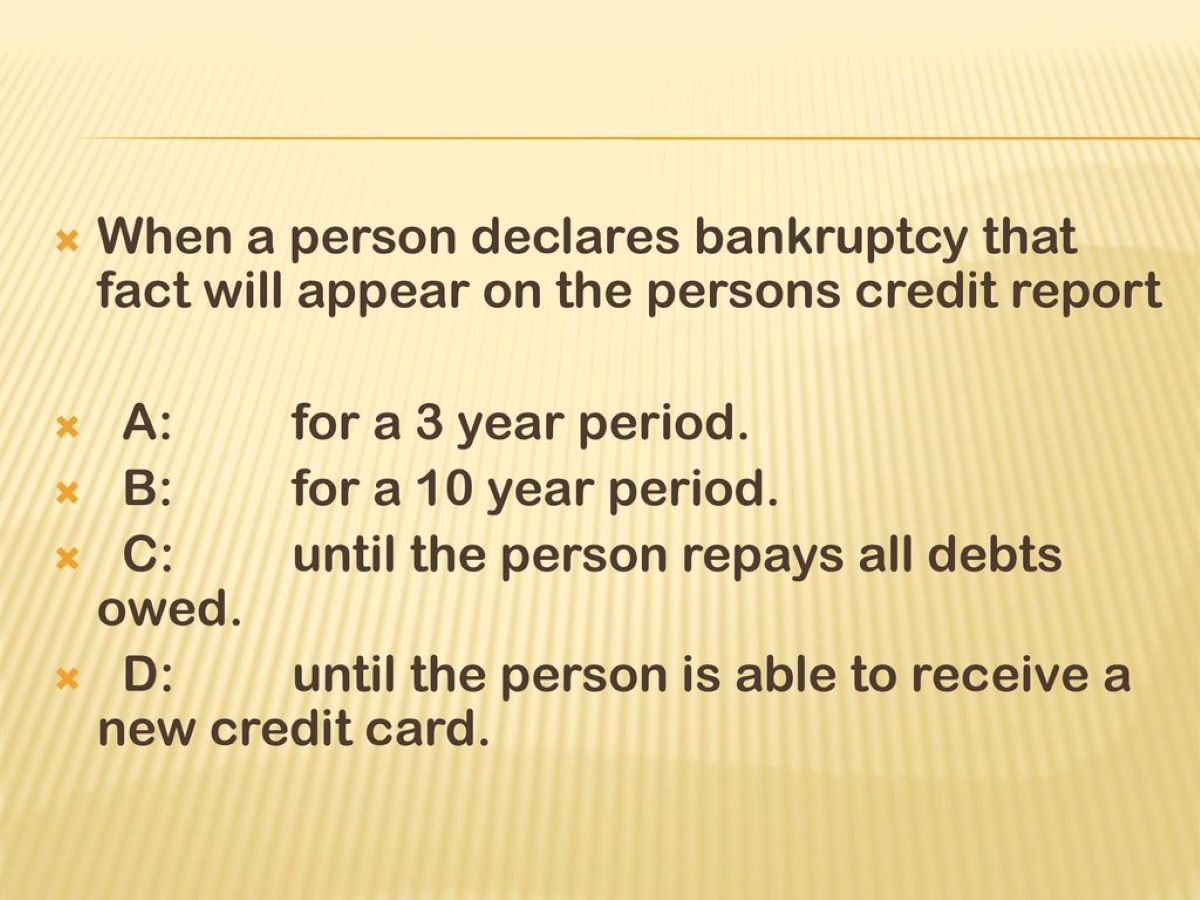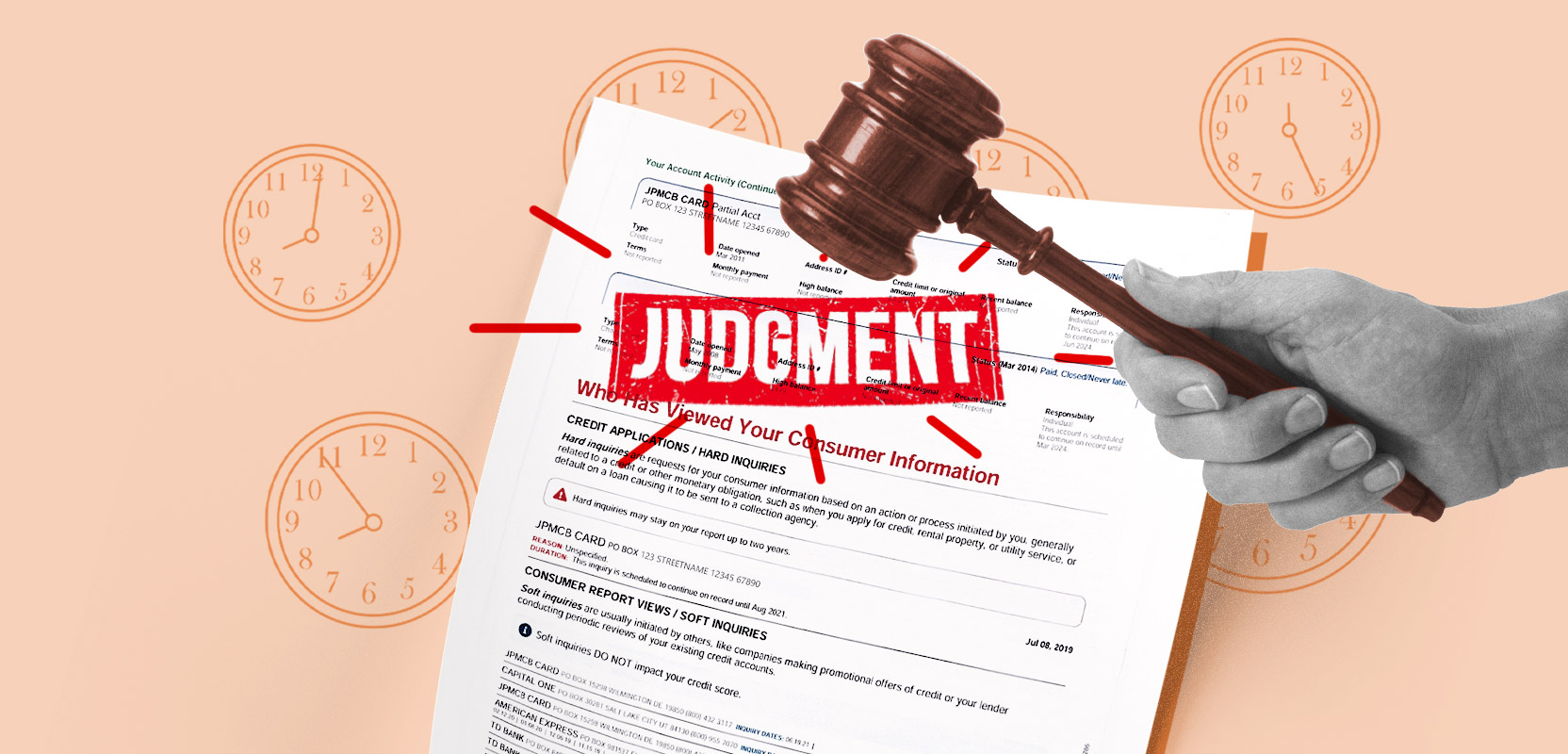Home>Finance>How Long For New Credit Card To Appear On Report


Finance
How Long For New Credit Card To Appear On Report
Modified: December 29, 2023
Learn how long it typically takes for a new credit card to appear on your credit report. Find out more about credit card reporting times and the impact on your finances.
(Many of the links in this article redirect to a specific reviewed product. Your purchase of these products through affiliate links helps to generate commission for LiveWell, at no extra cost. Learn more)
Table of Contents
Introduction
When you apply for a new credit card, it’s natural to wonder when it will appear on your credit report. Understanding the time it takes for a new credit card to appear on your credit report is important for several reasons. First, it allows you to monitor your credit activity and ensure that the card is reported accurately. Second, it affects your credit score and can impact your ability to access credit in the future.
Credit reporting plays a crucial role in the financial industry. It is the process through which credit card issuers and other financial institutions report your credit activity to credit reporting agencies, such as Equifax, Experian, and TransUnion. These agencies compile your credit information and use it to calculate your credit score, a numerical representation of your creditworthiness.
The time it takes for a new credit card to appear on your credit report can vary depending on various factors, including the credit card issuer’s reporting practices and the efficiency of the credit reporting agencies. In this article, we will explore the factors that affect credit card reporting time, the average time it takes for a credit card to appear on your credit report, and the importance of prompt reporting for credit card users. We will also provide strategies to ensure that your credit card is reported in a timely manner.
Factors Affecting Credit Card Reporting Time
The time it takes for a new credit card to appear on your credit report can be influenced by several factors. It’s important to understand these factors to set realistic expectations and ensure that your credit information is accurately reported.
1. Credit Card Issuer’s Reporting Frequency: Different credit card issuers have varying reporting frequencies. Some issuers report credit card information to the credit bureaus on a monthly basis, while others may report more frequently, such as every two weeks. The frequency at which your credit card issuer reports to the credit bureaus plays a significant role in how quickly your new credit card appears on your credit report.
2. Credit Card Activation: In some cases, your credit card may need to be activated before the issuer reports it to the credit bureaus. Activation is usually a straightforward process that involves confirming receipt of the card and verifying your identity. However, if you delay activating your card, it may delay the reporting process and the appearance of the card on your credit report.
3. Credit Reporting Agency Processing Time: Once your credit card issuer reports your new credit card information to the credit reporting agencies, it may take some time for the agencies to process the information and update your credit report. The processing time can vary, but it typically ranges from a few days to a couple of weeks.
4. Credit Reporting Agency Updates: Credit reporting agencies update credit reports at different intervals. Some update reports frequently throughout the month, while others do so on a monthly basis. The timing of the update can affect how quickly your new credit card appears on your credit report.
5. Verification and Accuracy Checks: Before the credit reporting agencies include your new credit card information in your credit report, they may conduct verification and accuracy checks. These checks ensure that the information provided by your credit card issuer is accurate and matches your credit profile. While these checks are necessary to maintain the integrity of credit reports, they can add additional time to the reporting process.
While these factors can influence the time it takes for a new credit card to appear on your credit report, it’s important to note that the reporting timeframes can vary for each individual. Factors such as the efficiency of the credit card issuer and the credit reporting agencies can also impact the overall reporting time.
Credit Card Issuers’ Reporting Practices
Credit card issuers play a vital role in the reporting of credit card information to the credit bureaus. Understanding their reporting practices can give you insights into how quickly your new credit card will appear on your credit report.
Most credit card issuers report credit card activity to the credit bureaus on a monthly basis. This means that they compile information about your credit card transactions, including your payment history and credit utilization, and send it to the credit reporting agencies. The specific date when the issuer reports this information can vary and is often based on the cardholder’s billing cycle.
It’s important to note that not all credit card issuers report to all three major credit bureaus – Equifax, Experian, and TransUnion. Some issuers may only report to one or two of these agencies. As a result, your new credit card may only appear on one or two of your credit reports, rather than all three.
In addition to monthly reporting, some credit card issuers may also report more frequently, such as every two weeks. This can be particularly beneficial if you need your credit information to be updated quickly, such as when you’re applying for a loan or mortgage.
Furthermore, credit card issuers are generally required by law to report accurate and up-to-date information to the credit bureaus. This includes information about your credit limit, account balance, payment history, and any changes or updates to your account status.
It’s important to be proactive in ensuring that your credit card information is being reported accurately. Regularly review your credit reports from all three credit bureaus to confirm that your new credit card is listed and that the reported information is correct. If you notice any errors or discrepancies, contact your credit card issuer immediately to have them rectified.
Remember, credit card issuers have their reporting practices, and while they strive to provide accurate and timely information, there can be delays or discrepancies in reporting. Being aware of these practices and monitoring your credit reports can help ensure that your credit information is up to date and accurately reflects your financial activities.
Average Time for Credit Card to Appear on Credit Report
While the time it takes for a credit card to appear on your credit report can vary, there is an average timeframe that can give you a general idea of when to expect it.
On average, it takes approximately 30 to 60 days for a new credit card to appear on your credit report. This timeframe is based on the typical reporting practices of credit card issuers and the processing time of credit reporting agencies.
Once you are approved for a new credit card, the issuer will typically report the account to the credit bureaus within the first billing cycle. This means that if you receive your credit card statement within a few weeks of being approved, it’s likely that your credit card information will be reported in the following month’s billing cycle.
After the credit card issuer reports your information to the credit bureaus, the credit reporting agencies will then need to process and update your credit report. This process can take anywhere from a few days to a couple of weeks, depending on their internal procedures and workload.
It’s important to keep in mind that this average timeframe is just an estimate. There are cases where the reporting process can be faster or slower. Factors such as the specific reporting practices of your credit card issuer, the efficiency of the credit reporting agencies, and any verification or accuracy checks can impact the overall reporting time.
To get a more accurate estimate of when your new credit card will appear on your credit report, you can contact your credit card issuer or the credit reporting agencies directly. They may be able to provide you with a more specific timeline based on their internal processes and current workload.
While waiting for your new credit card to appear on your credit report, it’s important to continue practicing responsible credit habits. Make timely payments, keep your credit utilization low, and monitor your credit activity regularly to ensure that your credit profile remains strong.
Remember that having a new credit card added to your credit report can impact your credit score. If you notice significant delays in the card appearing on your report or any inaccuracies, it’s essential to address these issues promptly by contacting your credit card issuer and the relevant credit reporting agencies.
Importance of Prompt Reporting for Credit Card Users
Prompt reporting of your credit card information is crucial for credit card users for several reasons. It not only ensures the accuracy of your credit report but also affects your credit score and future credit opportunities.
1. Accurate Credit Profile: Reporting your credit card information promptly helps to ensure that your credit report accurately reflects your current credit activity. This includes your payment history, credit utilization, and account balance. By having an up-to-date credit profile, you provide lenders and creditors with accurate information when they assess your creditworthiness.
2. Credit Score Impact: Your credit score is a vital factor considered by lenders when you apply for credit. Timely reporting of your credit card information allows credit scoring models to accurately calculate your credit utilization ratio, which is the percentage of your available credit that you are currently using. A lower credit utilization ratio positively impacts your credit score and demonstrates responsible credit management.
3. Future Credit Opportunities: Maintaining an updated credit report is essential for accessing future credit opportunities. Whether you’re applying for a mortgage, car loan, or a new credit card, lenders rely on accurate credit information to evaluate your creditworthiness. Prompt reporting ensures that your credit activity, including your new credit card, is considered in these assessments, potentially increasing your chances of approval and favorable terms.
4. Identity Theft Protection: Timely monitoring of your credit report allows you to identify any unauthorized or fraudulent activity on your account. By promptly reporting your new credit card, you can ensure that any suspicious or unauthorized transactions are detected early and rectified to minimize potential damage to your credit history and financial well-being.
5. Credit Building and Improvement: For individuals looking to build or improve their credit history, prompt reporting of a new credit card is essential. Demonstrating a history of responsible credit use, including making timely payments and maintaining a low credit utilization ratio, can positively impact your credit score over time. The sooner your new credit card is reported, the sooner you can start building a positive credit history.
Ultimately, prompt reporting of your new credit card information is essential for maintaining an accurate credit profile, maximizing your credit score, and accessing future credit opportunities. By staying proactive in monitoring your credit report and contacting your credit card issuer or credit reporting agencies if there are any delays or inaccuracies, you can ensure that your credit information remains up to date and reflects your financial habits accurately.
Strategies for Ensuring Prompt Credit Card Reporting
To ensure that your new credit card is reported promptly to the credit bureaus, there are several strategies you can implement:
1. Activate Your Credit Card: Once you receive your new credit card, make sure to activate it as soon as possible. Activation is often a simple process that can be done online or by phone. By activating your card promptly, you initiate the reporting process and set the wheels in motion for it to appear on your credit report.
2. Monitor Your Credit Reports: Regularly monitor your credit reports from all three major credit bureaus—Equifax, Experian, and TransUnion. By reviewing your reports, you can confirm that your new credit card is listed and that there are no errors or discrepancies. If you notice any issues, contact your credit card issuer and the relevant credit bureaus immediately to have them rectified.
3. Follow Up with Your Credit Card Issuer: If a significant amount of time has passed since you received your new credit card, and it still hasn’t appeared on your credit report, consider contacting your credit card issuer. They can provide you with information on their reporting practices and confirm whether they have reported your credit card information to the credit bureaus.
4. Contact the Credit Reporting Agencies: If you have confirmed that your credit card issuer has reported your credit card information, but it still hasn’t appeared on your credit report after a reasonable amount of time, reach out to the credit reporting agencies. They can assist you in verifying if there are any delays or issues in updating your credit report. Provide them with the necessary documentation, such as proof of your new credit card, to facilitate the process.
5. Maintain Good Credit Habits: While not directly related to the reporting process, it’s important to maintain good credit habits to ensure that your credit report reflects responsible credit management. Make timely payments, keep your credit utilization low, and regularly review your credit activity. By demonstrating good credit habits, you create a positive credit history that benefits your overall credit profile.
Remember, while you can take steps to ensure prompt credit card reporting, there may still be factors beyond your control that can affect the timeline. Each credit card issuer and credit reporting agency operates differently, and delays or errors can occur. Stay vigilant, monitor your credit reports, and address any discrepancies promptly to maintain the accuracy of your credit information.
Conclusion
Understanding the time it takes for a new credit card to appear on your credit report is important for managing your credit effectively. While the specific timeframe can vary, there are key factors that affect credit card reporting time.
Credit card issuers’ reporting practices, including their frequency of reporting and which credit bureaus they report to, play a significant role in when your new credit card appears on your credit report. Additionally, credit reporting agencies’ processing time and verification processes can impact the overall reporting timeframe.
Prompt reporting of your credit card information is vital for maintaining an accurate credit profile, positively impacting your credit score, and accessing future credit opportunities. By ensuring that your new credit card is reported promptly, you can demonstrate responsible credit use and build a strong credit history.
To ensure prompt credit card reporting, activate your credit card as soon as you receive it. Regularly monitor your credit reports to confirm the accuracy of your credit information. If there are any delays or discrepancies, follow up with your credit card issuer and the credit reporting agencies to address the issue. Additionally, maintaining good credit habits, such as making timely payments, can further strengthen your credit profile.
While you can take proactive steps to ensure prompt credit card reporting, it’s important to note that the timeline can vary for each individual and is subject to external factors. Stay engaged with your credit activity, monitor your credit reports regularly, and address any concerns promptly to maintain the accuracy of your credit information and maximize your credit opportunities.
In conclusion, understanding the factors affecting credit card reporting time, being proactive in ensuring prompt reporting, and practicing responsible credit habits are essential for managing and maximizing your credit health.














